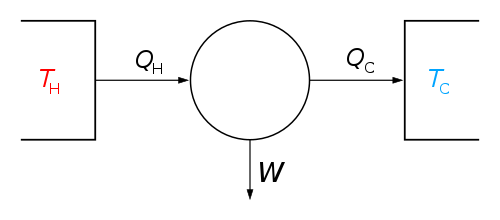Philosophy of thermal and statistical physics
The philosophy of thermal and statistical physics is that part of the philosophy of physics whose subject matter is an amalgam of classical thermodynamics, statistical mechanics, and related theories. Its central questions include: What is entropy, and what does the second law of thermodynamics say about it? Does either thermodynamics or statistical mechanics contain an element of time-irreversibility? If so, what does statistical mechanics tell us about the arrow of time? What is the nature of the probabilities that appear in statistical mechanics?
| Thermodynamics | ||||||||||||
|---|---|---|---|---|---|---|---|---|---|---|---|---|
 The classical Carnot heat engine | ||||||||||||
|
||||||||||||
| ||||||||||||
See also
References
- Uffink, J., 2001, "Bluff your way in the second law of thermodynamics," Studies in History and Philosophy of Modern Physics 32(3): 305–94.
- --------, 2007, "Compendium of the Foundations of Classical Statistical Physics" in Butterfield, J., and John Earman, eds., Philosophy of Physics, Part B. North Holland: 923–1074.
- Valev, P., 2002, "The Law of Self-Acting Machines and Irreversible Processes with reversible Replicas," in Sheehan, D., (ed.) Proceedings of the First International conference on Quantum Limits to the Second Law, American Institute of Physics: 430–35.
- Martinas et al., Thermodynamics: History And Philosophy - Facts, Trends, Debates
- Hoyer, Thermodynamics and Philosophy: Ludwig Boltzmann
- Sklar, Physics and Chance: Philosophical Issues in the Foundations of Statistical Mechanics
- Ernst & Hüttemann, Time, Chance, and Reduction: Philosophical Aspects of Statistical Mechanics
External links
- Sklar, Lawrence (2015). "Philosophy of Statistical Mechanics". Stanford Encyclopedia of Philosophy. Retrieved 2019-04-17.
- Uffink, Jos (2014). "Boltzmann's Work in Statistical Physics". Stanford Encyclopedia of Philosophy. Retrieved 2019-04-17.
This article is issued from Wikipedia. The text is licensed under Creative Commons - Attribution - Sharealike. Additional terms may apply for the media files.